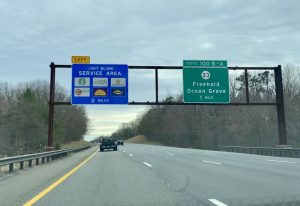 If you grew up in the United States, you must know who Judy Blume is. If you didn’t, the name may still sound familiar, especially if you are interested in banned books.
If you grew up in the United States, you must know who Judy Blume is. If you didn’t, the name may still sound familiar, especially if you are interested in banned books.
The Newark Star-Ledger’s headline that one of the rest areas along the Garden State Parkway was recently named after Judy Blume is not necessarily front-page news amidst our world crumbling with a pandemic, the Russian invasion in Ukraine, and the intolerance and hate speech scaling up as a result.
So what’s the big deal? Why does this matter today?
Let’s start with Judy Blume. Born in New Jersey, one of America’s best-selling writers of books for children and young adults, Judy Blume (née Sussman) wrote 29 books which have sold over 80 million copies across 32 different languages. Several of her books are among the all-time best-selling children’s books. Some of her best known titles are Are You There God? It’s Me, Margaret, Tales of a Fourth Grade Nothing, Deenie, and Blubber. As an author of children’s and young adult books, her works are often listed among the most frequently banned and challenged books. See more in our source, the Wikipedia entry on Judy Blume.
Why does it matter to us? Books We Read is committed to intellectual freedom, and that includes fighting against censorship. If you missed our posts and events on banned books, read some, such as the introduction to Banned Books Week, Ban No More on intellectual freedom and ALA, What is Samizdat, or our review of an entire book discussing cases of violating intellectual freedom.
Moreover, we advocate for professional librarians’ groups that observe Banned Books Week all over the world. No wonder we think that Judy Blume makes everyone who feels the same proud.
The American Library Association has been collecting the most frequently challenged authors and books for decades. Five of Judy Blume’s books are on the list of The 100 Most Frequently Challenged Books of 1990 to 1999. She is also among the most frequently challenged authors of the 21st century. Additionally, the National Coalition Against Censorship honored Judy Blume for her activity to defend her speech and her career courage to speak up against censorship.
Particularly notable for us here is a nonfiction book she coauthored that guides teachers, librarians, and parents how to deal with sensitive topics with children and teenagers via reading. Published by ALA Editions, Teaching Banned Books : 12 Guides for Young Readers features twelve short stories by censored writers for students ages 12-up. After setting the scene via reading aloud a related text, sensitive issues like mugging, homelessness, first experiences with sex, racism, bullying, and more can be discussed with the help of questions and related activities researching, writing, reading up on details, or writing a newspaper article related to the topic. Other books by the the same author as well as “fiction connections” lists of related books with brief descriptions provide additional reading.

Source: Google Earth. Click on the picture to find it on the map.
Circling back to the original question, why is it such a big deal that the New Jersey Turnpike Authority continues renaming some of the rest areas using celebrities who were born in New Jersey?
First, when a name keeps jumping in my face, say, on a giant billboard while driving, it always makes me curious to find out more about the person. In other words, a mild attack of intellectual curiosity takes the better of some of us who still practice it. Many will already be familiar with current rest stop honorees such as baseball player Larry Doby and rockstar-philanthropist-political activist Jon Bon Jovi, or the next few planned, such as Whitney Houston, James Gandolfini, Toni Morrison, and Frank Sinatra.
So why is renaming a rest area after an author of frequently banned books important to us?
The New Jersey Hall of Fame lists several writers, including twentieth-century and contemporary authors such as Toni Morrison, F. Scott Fitzgerald, Philip Roth, Mary Clark Higgins, Joyce Carol Oates, and Harlan Coben, in addition to inductees honored for their contributions to society in categories such as public service, sports, arts, and entertainment.

The new sign on the Garden State Parkway from Star Ledger. Click on the image to find it on the map.
I’d like to believe that the publicity and visibility the NJ Turnpike Authority provides and the exposure to the idea of banned books on the Garden State Parkway send a message that the State of New Jersey is committed to freedom of speech. It sends a message that books that might be banned or challenged elsewhere have a safe spot on the shelves of New Jersey libraries.
Now it’s the job of educators, teachers, librarians, and parents to keep the open mind that our children inherently possess open and preserve their intellectual curiosity, critical thinking, and informed opinion.
Happy to live in New Jersey. Happy to work for the State University.
- Judy Blume’s works in Rutgers Libraries (search results, some restricted)
- Judy Blume on censorship
- Scales, & Blume, J. (2000). Teaching Banned Books:12 Guides for Young Readers. ALA Editions.
- The School Collection: Children’s Literature from Illinois Library